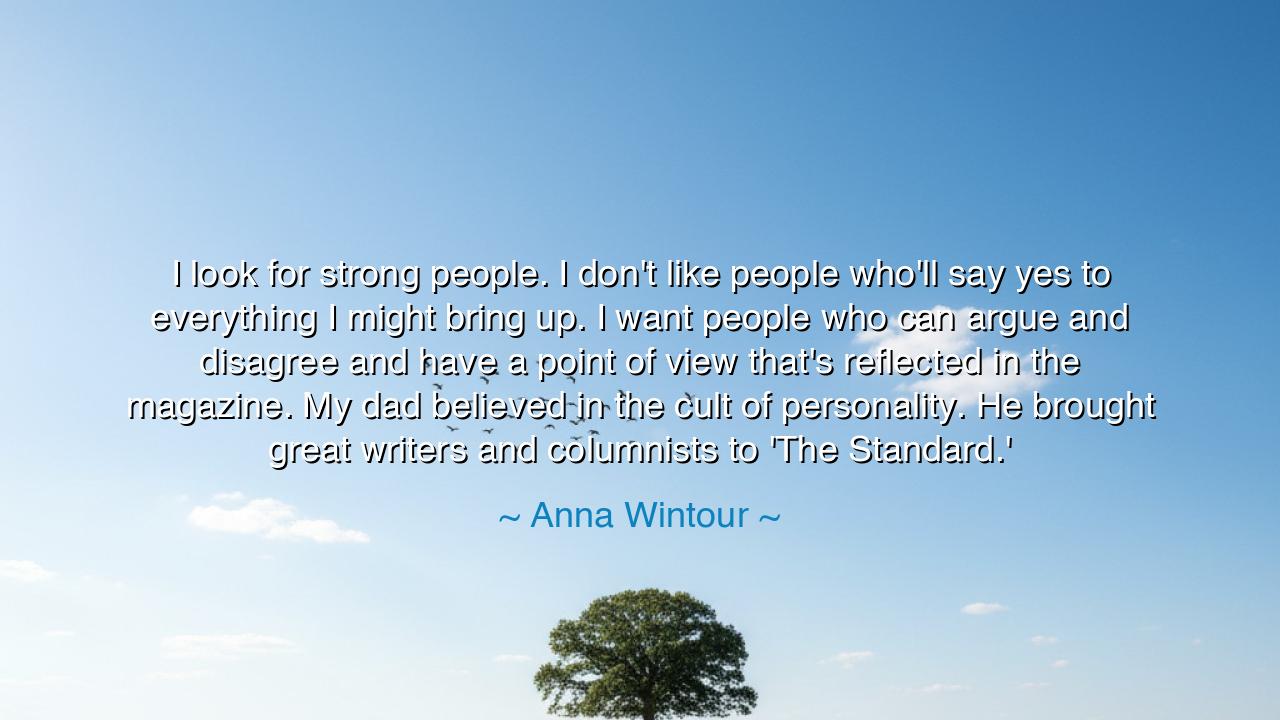
I look for strong people. I don't like people who'll say yes to
I look for strong people. I don't like people who'll say yes to everything I might bring up. I want people who can argue and disagree and have a point of view that's reflected in the magazine. My dad believed in the cult of personality. He brought great writers and columnists to 'The Standard.'






Hearken, children of the ages yet to come, and absorb the enduring wisdom of Anna Wintour, who declared: “I look for strong people. I don't like people who'll say yes to everything I might bring up. I want people who can argue and disagree and have a point of view that's reflected in the magazine. My dad believed in the cult of personality. He brought great writers and columnists to 'The Standard.'” Within these words lies a profound meditation on courage, integrity, and the cultivation of excellence through challenge, teaching that greatness is nurtured not in submission, but in the interplay of intellect, opinion, and bold expression.
Wintour’s reflection reveals that the strength of an endeavor is measured by the quality of those who surround it, not by passive compliance. The ancients understood this: Plato, in guiding the philosopher-kings, emphasized that wise counsel must be free and fearless, for true governance is shaped through the clash of reasoned minds. To foster brilliance, one must seek those who challenge, question, and argue, thereby sharpening both thought and action.
Consider the life of Pericles, who led Athens during its golden age. He surrounded himself with thinkers, strategists, and orators who did not merely echo his ideas, but contested them, tested them, and refined them. It was in this exchange of vision and counter-vision that Athens flourished in art, democracy, and intellect. Wintour’s insistence on strong voices echoes this principle: excellence emerges when the bold, the skilled, and the independent collaborate.
Her reference to her father’s belief in the “cult of personality” reflects another ancient truth: leadership is magnified not only by authority, but by the presence of extraordinary individuals who lend their talent, insight, and vision. Just as Julius Caesar valued Cicero’s oratory and counsel, Wintour honors writers and columnists whose distinct voices enrich the whole. Great leaders recognize that strength is amplified through the diversity and vigor of those they empower.
The preference for disagreement and reflection over blind assent is more than a professional strategy; it is a moral principle. The ancients prized frankness in discourse, understanding that unchallenged opinion leads to stagnation, error, and mediocrity. Wintour’s insight teaches that truth and creativity require debate, courage, and a willingness to face opposition, for it is only through rigorous exchange that ideas are tempered and refined.
From this reflection emerges a timeless lesson: cultivate relationships and collaborations with those of independent thought, moral courage, and skill, for the pursuit of excellence is sustained by challenge and integrity. Leaders and creators alike must resist the allure of conformity and seek the fire of disagreement to illuminate truth, innovation, and lasting achievement.
Practical guidance flows naturally: in your endeavors, surround yourself with those who think differently, question freely, and voice convictions. Encourage dialogue, reward courage, and embrace constructive conflict. Whether in art, business, or governance, recognize that the quality of output is inseparable from the strength and independence of those who contribute to it.
Children of the ages, let Anna Wintour’s teaching anchor your hearts: greatness is forged in the crucible of courage, debate, and collaboration. Seek those who challenge you, value those who bring vision and voice, and cultivate an environment where strength of character and intellect are celebrated over compliance. In this, your pursuits—be they creative, civic, or personal—will be elevated, enduring, and reflective of the highest ideals of human endeavor.
If you wish, I can also craft a more narrative, evocative version, portraying Wintour’s interactions and her father’s influence as a vivid story of mentorship and challenge, perfect for oral storytelling. Do you want me to do that?






AAdministratorAdministrator
Welcome, honored guests. Please leave a comment, we will respond soon